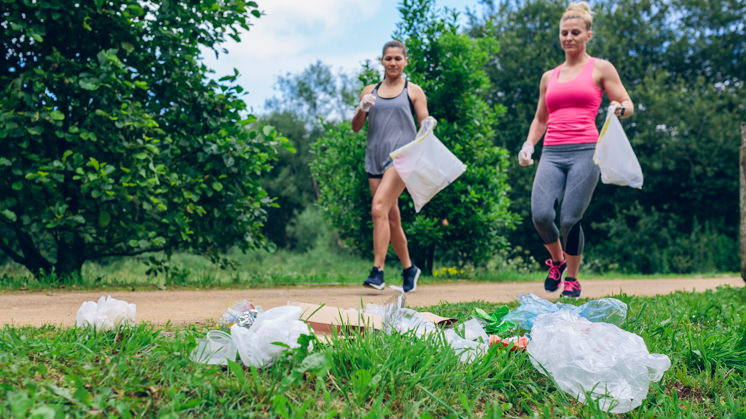'Plogging'
'Plogging', the running that mixes ecology and sport
Plogging is a new sustainable initiative invented in Sweden which combines sports like jogging with caring for the environment. The more than 20,000 people who do it each day — in over 100 different countries — pick up rubbish that they find on the ground when they go out running. Fancy a go?

The worldwide passion for running continues to grow. The Strava app, one of the most widely used by popular athletes to record and share their activities, exceeded 36 million users in 2018. This year alone, the Strava joggers have run over 1.5 billion kilometres between them - enough to circumnavigate the world 38,000 times. Just think how much rubbish these runners could collect if they did a bit of 'plogging'!
What is 'plogging'? History and origins
'Plogging' is a new global movement that originated in Sweden. It takes advantage of jogging and other outdoor sports to pick up the litter that spoils our cities and natural spaces. The idea of this sustainable initiative is simplicity itself: the participants, 'ploggers', take to the streets with rubbish bags to pick up the litter they come across while exercising.
The word 'plogging' comes from the Swedish plocka upp (pick up) and the English word jogging. The pioneer of this activity was Erik Ahlström, who, on leaving his hometown in 2016 to settle in Stockholm, started to clean up the rubbish in the areas where he practised his sport. Soon after, Ahlström's routine spread throughout Sweden as a result of popular events and today, thanks to social media, it is a global phenomenon involving over 20,000 people a day in more than 100 countries.
'Plogging' benefits



SEE INFOGRAPHIC: The 5 great benefits of running and 'plogging' [PDF]
Advice for taking up 'plogging'
The initiative's website, Plogga, gives 'Ploggers' some tips on how to get into this activity, which only needs a bag, some running shoes and half an hour a day. These are the main ones:
'Plog' in a group
This activity, like other individual sports, is more fun if you join in with others to do it.
Combine it with other exercises
When picking rubbish up off the floor do it by squatting or by bending on one leg. Bending down will improve articulation of the hip, aductor muscles and ankles.
Swap the bag between arms
Do this often to avoid strains from constantly carrying all the weight on one side. Use gloves too, to keep your hands clean.
Do sprints
To improve cardio-vascular performance it's good to run less than 10 kilometres and intensify the session by climbing, jumping or changing speed.
Include competition dynamics
Play in teams with other 'ploggers' to see who can pick up the most litter in the shortest time. At the end of the session, put all the rubbish together and take it to the nearest recycling point.
Try it with other sports
'Plogging' is not only for joggers. You can also do it if you like walking, rowing or cycling.
Share your activity on social media
Take photos of your sessions and share them on social media with the hashtag #Plogging. This can inspire others and help to spread the movement.
'Ploggers' - strength in unity
One of the most surprising aspects of 'plogging' is its rapid international growth. In scarcely 3 years, the initial impulse of an anonymous citizen has spread like wildfire through 5 continents, and almost all the world's major cities, like London, Mexico City and Seoul have 'plogging' groups.
The contributory factors to the success of this initiative include, for example, growing concern for ecology and a healthy lifestyle, the fashion for jogging, and the simplicity and community spirit engendered by 'plogging' amongst its followers. Fans of this practice develop typical sporting values such as companionship, solidarity, effort and perseverance at the same time as emphasising their commitment to the environment.
The North American news portal BuzzFeed News reports that the litter that 'ploggers' pick up the most includes single-use plastics such as bottles and plastic tops, sandwich and sweet wrappers, fast food packaging, lids, straws and disposable cutlery.




